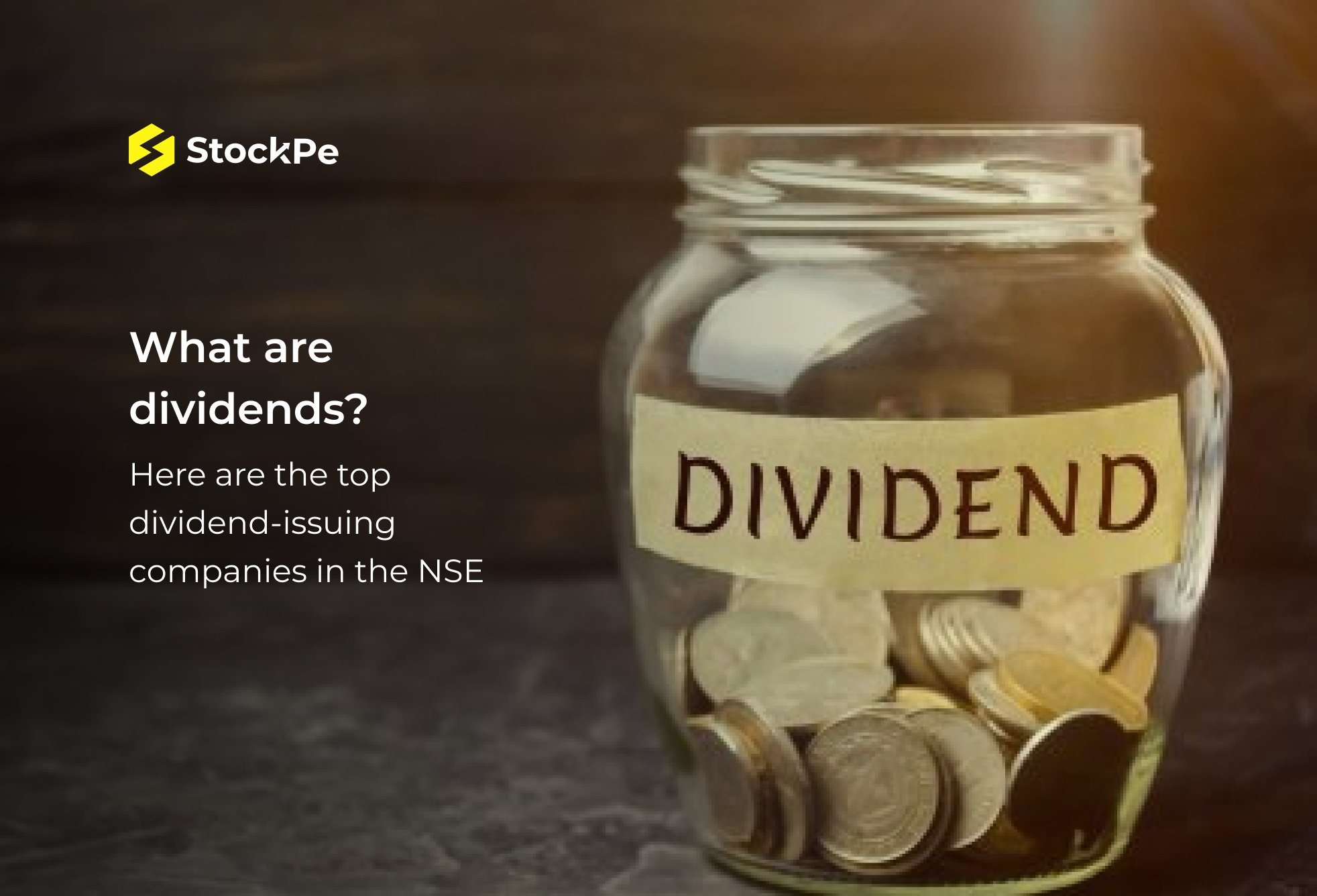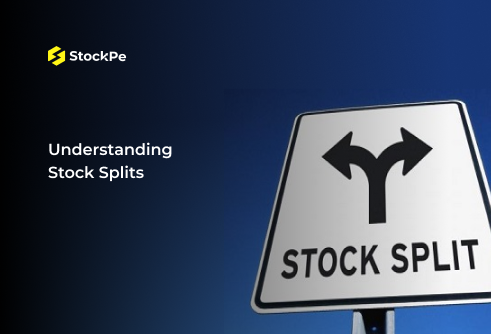Among the myriad of ways, one way investors earn money is through acquiring stocks and then holding them for an extended amount of time, and finally selling them once they’ve gone up in price earning capital gains.
Stock market investments are arguably one of the best ways to build long-term wealth. Even if you’re new to investing in the stock market you’ve probably known or have heard about dividends. Dividends simply are payments that publicly traded companies make to its shareholders and it can take the form of cash or additional shares that are known as stock dividends.
Another way for investors to receive a portion of a company’s profit is through dividends. In the upcoming blog, you will clearly understand the ins and outs of dividends. We will also tell you about the top top dividend-issuing companies in the National Stock Exchange (NSE) with the latest data!
What is a dividend?
A dividend is a small part of a company’s profits that is paid to a shareholder. Among the most common types of dividend is cash ; however, many companies issue stock dividends.
Dividends are generally issued quarterly. Although it can also be disbursed monthly and annually.
The dividends an investor can expect to earn depends on several factors, including the number of shares owned, the company invested in, and the frequency of dividend payments. These distributions are announced in advance and determined by the company’s board of directors.
It’s important to note that these payments can vary and fluctuate in regular intervals in response to changes in the company’s profits, or even general market conditions if there are major changes in the company’s sector.
Why do companies pay dividends?
Companies generally pay dividends to attract more investors. Investors are of various kinds and all investors do not like to play the long game. Giving dividends payouts are a way used by the companies to keep investors interested in investing in their company.
Having enough funds to pay dividends gives a sign to the investors that the company they’re investing in is doing well. To consistently pay a dividend a firm needs to generate sufficient cash flow. Consistent dividend payments over a long time is a sign that a firm has a business model that will work in the long run.
It must be noted that all companies do not pay dividends. Some companies choose to keep the funds and reinvest them in the company, particularly if the company is not well established or focused on expanding. It’s common for companies to stop dividends if they’re experiencing some financial trouble like a dip in revenue or an expensive lawsuit.
Do dividends affect share price?
Dividends can affect share prices in many ways. After the ex-dividend date, a stock’s price generally drops by the amount of the dividend because the value of the dividend is no longer included in the stock price.
Companies that retain their earnings for growth instead of paying dividends might see lower share prices, as investors may find them less attractive. On the other hand, large companies that consistently pay dividends on time can enjoy higher share prices due to their solid market reputation and perceived financial stability.
What types of companies pay dividends?
Like any other investment, dividends on stocks are never guaranteed but dividends are likely to be paid by well-established big companies that no longer need to reinvest as much money back into their business. As a result, stocks that pay dividends are known to provide a stable and growing income stream.
Dividends are often equated with a company’s financial well-being. Once a company announces a dividend, investors expect it to be maintained, even when the company goes through tough times. Investors can devalue a stock if the dividend is reduced, which in turn lowers the share price.
Top 10 Dividend Issuing Companies In National Stock Exchange (NSE)
Before we dive into the list of top companies offering the highest dividend yields, it’s important to remember that high dividends can be a solid sign of financial stability and a commitment to returning value to shareholders. However, always consider the overall financial health and future growth prospects of a company before making any investment decisions.
| Stock | Domain | Market Capitalisation (In USD) | SharePrice (In INR) | Dividend Yield (Annual) |
| Indian Oil Corporation Ltd | Oil & Gas – Refining & Marketing | $28.32 Billion | ₹166.67 | 7.20% |
| Vedanta Ltd | Metals – Diversified | $20.14 Billion | ₹449.40 | 9.03% |
| Chennai Petroleum Corporation Ltd | Oil & Gas – Refining & Marketing | $1.73 Billion | ₹973.90 | 5.65% |
| Hindustan Petroleum Corp Ltd | Oil & Gas – Refining & Marketing | $9.02 Billion | ₹524.05 | 5.80% |
| Coal India Ltd | Mining – Coal | $35.31 Billion. | ₹476.35 | 5.01% |
| Oil and Natural Gas Corporation Ltd | Oil & Gas – Exploration & Production | $41.62 Billion | ₹271.70 | 4.44% |
| HCL Technologies Ltd | IT Services & Consulting | $46.95 Billion | ₹1,444.00 | 3.87% |
| ITC limited | It Services & Consulting | $63.42 Billion | ₹ 423.40 | 3.25% |
| Great Eastern Shipping Company Ltd | Oil & Gas – Storage & Transportation | $2.08 Billion | ₹1,189.50 | 3.73% |
| Tech Mahindra Ltd | Information technology, and financial services | $ 16.09 Billion | ₹1,379.00 | 2.90% |
What factors should be considered before investing in dividend-paying Stocks?
Before investing in dividend-paying stocks, it’s essential to understand that while they can provide a steady income stream, they might not be the best choice for every investor. Here are some key factors to consider:
- Potential for Limited Growth: Dividend-paying stocks may not show immense growth. Companies that have grown multiple-folds often do not pay dividends.
- Stable Income: These stocks are ideal for investors seeking stable income and are willing to invest for the long term. They usually represent stable companies that have reached a certain level of market saturation.
- Setting Investment Goals: Setting clear goals for annual returns is crucial. Aim to invest in stocks that offer an annual growth rate, including dividends, between 5% to 15%.
- Financial Health: Consider the overall financial health and future growth prospects of the company. High dividends can indicate financial stability, but it’s essential to ensure the company is not sacrificing future growth.
- Market Conditions: Be abreast of market conditions and economic factors that might affect dividend payouts. Companies might reduce dividends in adverse economic situations to conserve cash.
What are the benefits of investing in high dividend yield stocks?
High dividend yield stocks give a consistent and reliable source of income through regular dividend payments. This can be really beneficial for persons who have retired or those looking to supplement their income without having to sell their investments.
Dividends that are received from stocks can be reinvested to purchase additional shares. This reinvestment process, often facilitated through Dividend Reinvestment Plans (DRIPs), can lead to compound growth over a period of time, significantly increasing the value of your investment.
Companies paying high dividends tend to have more predictable earnings and are less likely to experience drastic downturn. This makes their stocks less riskier compared to non-dividend-paying stocks.
Stocks with high dividend stocks generally exhibit lower price volatility compared to growth stocks because the regular income from dividends provides a cushion during market fluctuations, helping to stabilize the stock price.
Investing in these shares, usually issued by market leading companies with a history of stable earnings, provide a sense of balance between income generation and potential capital appreciation, making them a key component of a diversified investment portfolio and strategy.
Lastly!
High dividend-yielding stocks signal companies with financial stability. They also indicate that the company is sustainable and that its stock can provide good returns over a longer period. Refer to the list of the best, highest dividend-paying stocks mentioned in this article when making your investment or financial plan.
FAQs
Q. How to find good dividend stocks?
Investors should look out for companies with long-term profitability and growth expectations between 5% and 10%. Companies should boast the cash flow generation necessary to support their dividend-payment programs.
Q. What do dividends tell you about a company?
Paying dividends sends a clear message about a company’s future potential and performance; its willingness and ability to pay regular dividends over time provides a solid demonstration of financial strength.
Q. Who is eligible for dividends?
In short, to be eligible for stock dividend payments, you must purchase the stock (or already own it) at least two days before the record date and still hold the shares at the close of trading one business day before the ex-dividend date. This means owning the shares one day before the ex-dividend date.
Q. Who Cannot declare dividend?
The condition under the Companies Act, 1956 is that a company must not declare dividend, where it has made default in the redemption of preference shares, has been dispensed with.
Q. Why should investors consider high dividend-paying stocks in the Nifty 50?
Investing in high dividend-paying stocks in the Nifty fifty (NSE) offers MANY benefits. These stocks provide a steady and reliable source of secondary income through regular dividend payments, which can be very appealing during times of market volatility.





